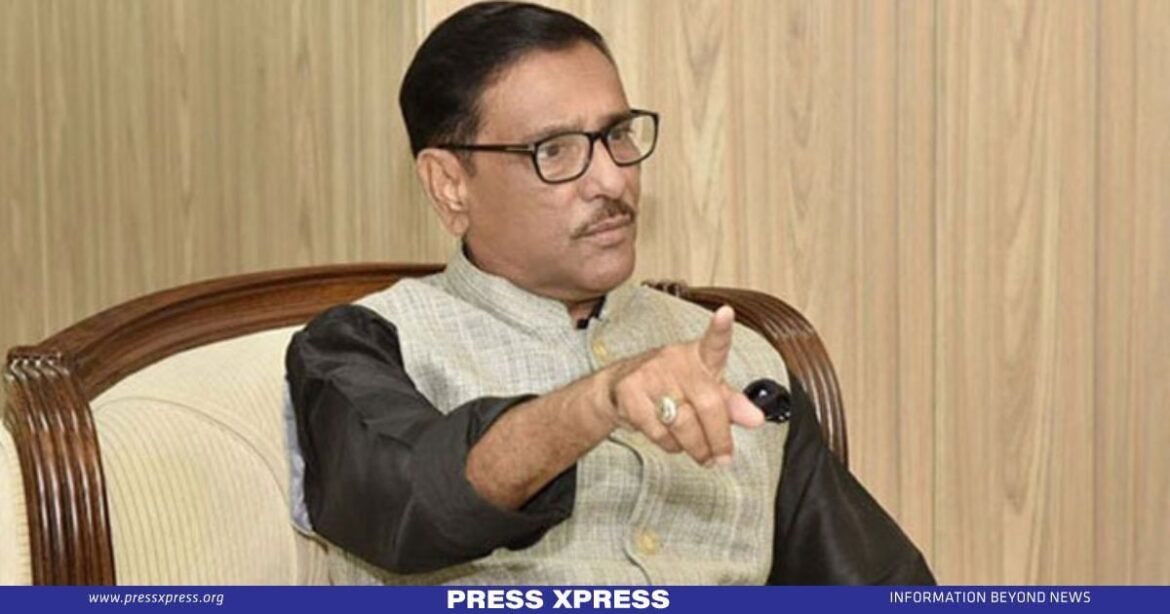“…the 12th national parliamentary elections will take place as scheduled according to the constitution, and no disruptive forces will be able to prevent it” – Obaidul Quader
The General Secretary of the Awami League, Obaidul Quader, recently made strong statements regarding the Bangladesh Nationalist Party (BNP). He accused BNP of plotting a deep-rooted conspiracy to undermine the upcoming 12th national elections. In a statement, Quader expressed concerns about the BNP’s actions, alleging that they aim to destabilize the democratic process, hinder development, and disrupt political stability in the country.
You can also read: “BNP aims to oust Khaleda Zia from politics”
According to Quader, the BNP’s actions are not new; they have consistently aimed to cast doubt on the democratic process while simultaneously disrupting the nation’s development and political stability. Quader, who also serves as the Minister of Road Transport and Bridges, emphasized that elections have historically been conducted in accordance with the constitution, and they will continue to be held in the same manner in the future.
BNP disrupt political stability
in 2014, the BNP allegedly orchestrated arson attacks across the country, resulting in the loss of innocent lives and the destruction of public and private properties, including polling booths and institutions like schools
One of the key points raised by Obaidul Quader is the history of the BNP’s involvement in disrupting elections. He pointed out that in 2014, the BNP allegedly orchestrated arson attacks across the country, resulting in the loss of innocent lives and the destruction of public and private properties, including polling booths and institutions like schools. Quader also highlighted that these actions included the killing of a judge and a lawyer through bomb attacks, as well as other acts of violence. These actions, he argued, raise serious questions about the BNP’s commitment to democratic processes and the rule of law.
Accusations of Nomination Trade, Irresponsibility
Obaidul Quader claimed that BNP’s acting chairman, Tarique Rahman, was involved in nomination trading while residing in London. He pointed out that in 2018 national election, the BNP provided nominations to approximately 750 candidates for the 300 available seats, indicating a lack of responsibility towards the democratic process and the people of Bangladesh. Quader argued that such actions demonstrate the BNP’s disregard for democracy, the constitution, and the law.
Quader also criticized of BNP Acting Chairman Tarique Rahman. He referred to Rahman as someone tarnished by corruption and convicted as a fugitive, insinuating that he enjoyed dubious privileges. Quader also raised concerns about the disproportionately high number of nominations provided by the BNP compared to the available seats, suggesting potential impropriety. Expanding on his critique, Quader expressed further dismay at the BNP leadership’s recent threats to disrupt the forthcoming elections. He argued that such threats underscored the BNP’s lack of responsibility toward the nation’s populace, democratic values, constitutional principles, and the sanctity of the rule of law.
Quader did not limit his critique there; he went on to categorize the BNP as an “illegitimate political party” with a historical track record steeped in behaviors contrary to democracy, constitutionality, and legality. He highlighted the pivotal moment in the BNP’s history as the military takeover by Ziaur Rahman, which marked a significant departure from democratic norms.
BNP’s Political History
The Awami League’s General Secretary also questioned the legitimacy of the BNP as a political party. He argued that the BNP’s history is marred by anti-democratic, unconstitutional, and illegal activities. Quader highlighted the rise to power of military dictator Ziaur Rahman at gunpoint as a significant event in the BNP’s history. He further contended that the BNP’s political agenda has primarily revolved around acquiring power rather than working for the welfare of the people or establishing their rights.
Over the past 15 years, the BNP and its alliance have found themselves on the outskirts of political power. After facing defeat in the 2008 elections, being absent from the 2014 electoral process, and failing to facilitate the 2018 elections, they chose a path of protest and agitation. Regrettably, these efforts in various movements bore no fruit, often resulting in widespread chaos and distancing them from the general population. This report delves into the underlying reasons for their consistent failures in these movements.
A regular turnover of ruling authorities can be advantageous for a country’s progress. However, when the alternative party fails to present an appealing vision for the nation, the notion of change for the sake of change loses its allure among the populace.
The BNP seems to lack a clear and well-defined ideology, rendering it a less compelling opposition force. While many political parties and groups in Bangladesh may primarily operate on clientelism, they still maintain some semblance of an underlying ideology.
Why BNP Faces Repeated Failures
In 2022, BNP and its partner, Jamaat-e-Islami, appeared to find an opportune moment in Bangladesh’s political landscape. Economic instability, triggered by rising global commodity and dollar prices due to Western sanctions on Russia and exacerbated by import controls and fuel price hikes, opened a window for the opposition. After years of relative inactivity, BNP and Jamaat regained political momentum.
They focused on reviving the demand for a caretaker government, a call that had waned since 2018. BNP organized public gatherings at various levels and revitalized its leaders and activists. The government faced growing calls for a unified opposition movement.
The return of Tarique Rahman from London and hints of Khaleda Zia’s potential return to power generated significant interest. However, they refrained from definitive announcements and instead issued a series of demands and a nationwide mass march. This evolving strategy left many questions about their true intentions unanswered by the end of the year.
Conclusion
Obaidul Quader’s statements reflect the growing tensions and accusations surrounding the BNP’s role in Bangladeshi politics. While these allegations are made by a member of the ruling Awami League, it is essential to remember that a fair and democratic electoral process is crucial for the stability and progress of any nation.


